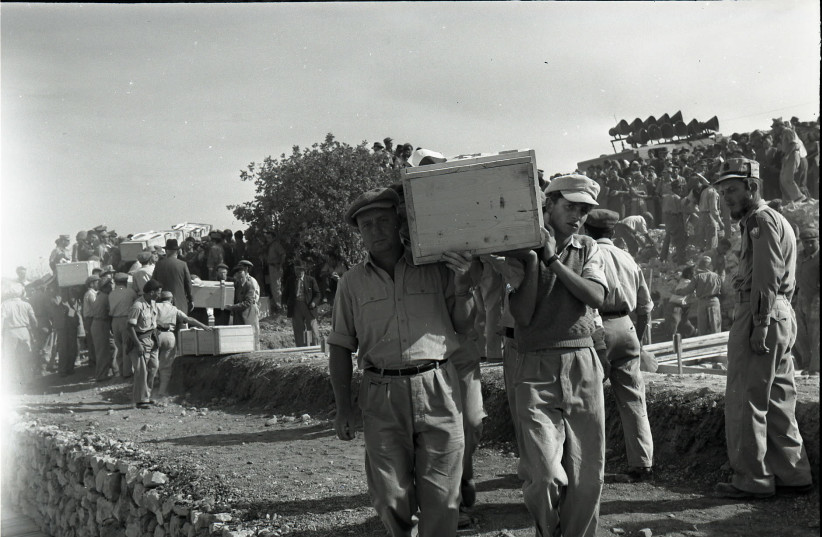‘To say the least, at the moment our chances are very weak. To be more frank, we have to admit that the enemy has a huge advantage,” Yigael Yadin, the commander of Haganah operations at the time and a future IDF chief of staff said in assessing Israel’s chances in its battles against its Arab enemies of the day. According to David Ben-Gurion, these words were spoken at a meeting on May 12, 1948, two days before the historic Israel declared itself a state.
Israel’s Independence Day in our modern perception is certainly one of the most important and happiest days in Jewish history. However, it was shrouded in extremely complex emotions of the leaders of the day.
The War of Independence began long before that fateful day. By May 1948, the hardest battles were already raging throughout the country. Jerusalem was under tight siege and the day before the Ben-Gurion’s proclamation, on May 13, the four kibbutzim of Gush Etzion fell, only to be revived only decades later.
Immediately after independence, the war broke out with renewed vigor on several fronts, and the first weeks of the fledgling Jewish state turned out to be perhaps the most complicated and the most decisive in its history and an armistice agreement was signed only in the summer of 1949.
Despite the dire forecasts of the newborn state’s imminent demise, Israel heroically withstood that war and everything that has come after it – 74 years packed with events, victories and successes – is already a notable history.

But Israel has also come in for a fair amount of criticism in the world’s press and social media regarding its actions over the years. However, in this criticism, if it does not morph into explicit antisemitiс comments, also lies a very important, positive grain for us. Our opinion and our position are important to the world and to Jewish communities. Today, we, as a state, are expected to be a full-fledged participant in global affairs.
We still live in a complex region, fundamentalist ideologies of hatred towards the Jewish state are still strong. Even after 74 years, Israel must still face existential threats, all the same fears of society and leadership. However, if at the beginning, our newborn state had to literally fight for its continued existence and solve many internal problems, today Israel is no longer just a local force – we have to think and act globally.
Technology is certainly a part of this process – a sector that has allowed the small Jewish state to become one of the leading economic forces that has gained us prominent international standing. The role of the innovation sector in the Israeli economy can be described just by one fact: since the beginning of 2022, 20 new so-called “unicorn” companies – private start-ups valued at over a billion dollars – have sprouted up and there are more than 60 such companies in the country, second place in the world after the United States. Some 6,400 start-ups per capita represent the highest density of innovative business in the world.
In peace and security, Israel is ready to cooperate and share its technologies. And now, other countries of the Middle East are coming to realize the importance of scientific and technological exchange and business partnership. The recently-signed Abraham Accords have already led to an unprecedented level of Israeli cooperation with Gulf states. Watergen company, which I run, is part of this process. We are working with partners in the United Arab Emirates to address water scarcity and food security in our region together.
Our devices, that can produce clean, fresh drinking water from the moisture in the air, are already operating in 85 countries. We are especially proud that several of them have been installed even in the Gaza Strip, where almost two million people suffer from a severe shortage of clean drinking water. Watergen was the only company to work with the Israel Defense Forces and with local partners to install dozens of its devices in Gaza. They are connected to solar panels and are located in hospitals and other healthcare organizations.
Throughout history, wars have often been waged over water resources. Today, we are doing precisely the opposite – we are making peace and building a common future with the help of water technologies.
Hundreds of companies in Israel today continue to build the image of our state as a global technological power with the aim to improve this world and its quality of life. Politically, we have to be on the same page.
We have a lot of hurdles and challenges still to overcome, but looking back every time, it’s hard to believe what an incredible journey we have taken in the past 74 years.
I heartily congratulate the State of Israel, its citizens, as well as all the Jews in the Diaspora on this common holiday for the entire Jewish people!
The author is president of the Euro-Asian Jewish Congress
